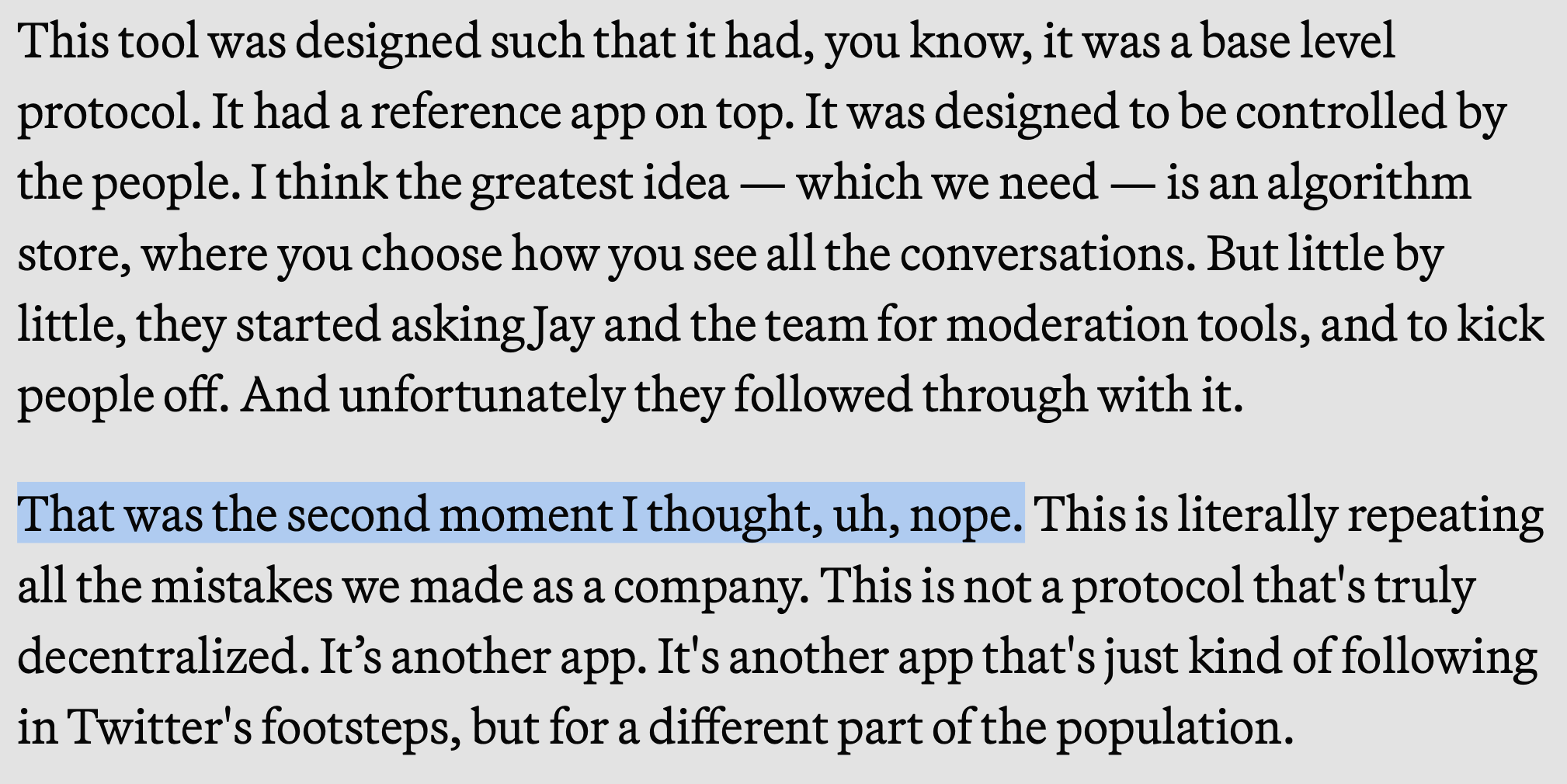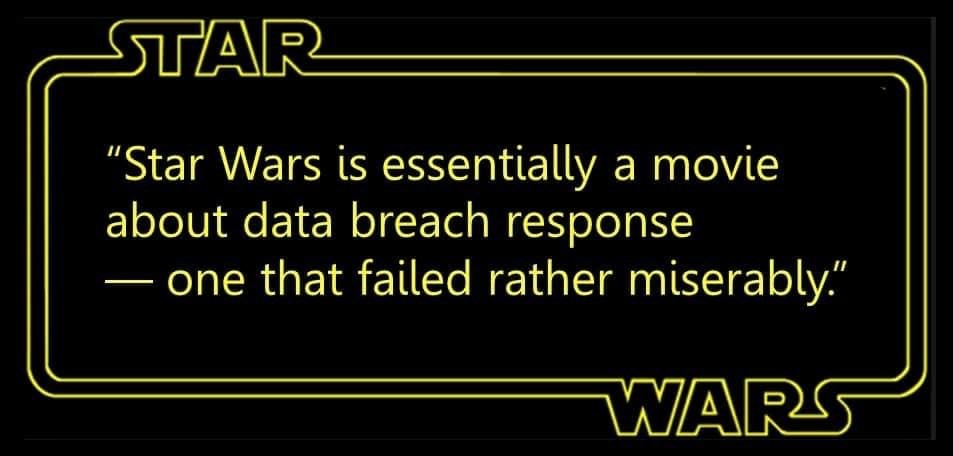Post details
SREs, dev ops, and other on-call folks, I am literally begging you to unionize
SREs, dev ops, and other on-call folks, I am literally begging you to unionize
I'm on Cup o' Go! (2 mins read).

Announcing my appearance on Cup o' Go, talking about oapi-codegen, OpenAPI, working on Open Source and blogging.
New: OpenAI—a company that has indiscriminately scraped vast amounts of human knowledge to build a company valued at roughly $80 billion—has made a copyright complaint against the ChatGPT subreddit because it used OpenAI’s logo. https://www.404media.co/openai-files-copyright-claim-against-chatgpt-subreddit/
Attached: 1 image Yikes, bailing on the platform you funded because they are worried about safety is quite the stand. https://www.piratewires.com/p/interview-with-jack-dorsey-mike-solana

Like many other technologists, I gave my time and expertise for free to #StackOverflow because the content was licensed CC-BY-SA - meaning that it was a public good. It brought me joy to help people figure out why their #ASR code wasn't working, or assist with a #CUDA bug. Now that a deal has been struck with #OpenAI to scrape all the questions and answers in Stack Overflow, to train #GenerativeAI models, like #LLMs, without attribution to authors (as required under the CC-BY-SA license under which Stack Overflow content is licensed), to be sold back to us (the SA clause requires derivative works to be shared under the same license), I have issued a Data Deletion request to Stack Overflow to disassociate my username from my Stack Overflow username, and am closing my account, just like I did with Reddit, Inc. https://policies.stackoverflow.co/data-request/ The data I helped create is going to be bundled in an #LLM and sold back to me. In a single move, Stack Overflow has alienated its community - which is also its main source of competitive advantage, in exchange for token lucre. Stack Exchange, Stack Overflow's former instantiation, used to fulfill a psychological contract - help others out when you can, for the expectation that others may in turn assist you in the future. Now it's not an exchange, it's #enshittification. Programmers now join artists and copywriters, whose works have been snaffled up to create #GenAI solutions. The silver lining I see is that once OpenAI creates LLMs that generate code - like Microsoft has done with Copilot on GitHub - where will they go to get help with the bugs that the generative AI models introduce, particularly, given the recent GitClear report, of the "downward pressure on code quality" caused by these tools? While this is just one more example of #enshittification, it's also a salient lesson for #DevRel folks - if your community is your source of advantage, don't upset them.
I'm a "full stack developer", in that my stack is full and if you try to push any more tasks on me I'm gonna overflow it and start corrupting my own memory
nothing is apolitical. hope this helps
Devs: We've finally got the thing that's definitely not a Torment Nexus you and running. That's awesome! We're gonna make a ton of money from tormenting people. They keep asking for it for any reason. Devs: Speaking of money, I think I deserve a raise. Absolutely not? Did you even do any work? Also, this thing requires the power of a small country to do even a small amount of tormenting. It's costing us billions. We're gonna have to let you go.
Responsible Disclosure: Using GitHub Search (without logging in using SSO) still allows searching (4 mins read).

Reporting on a HackerOne responsible disclosure that I found in GitHub, where you could exfiltrate data without signing in to GitHub SSO.
I will be attending
Will you help us build the Torment Nexus? Devs: What?! Absolutely not! What if we paid you $1 million a year? Devs: It's not about the money. My reputation is at stake! You could tell people you had no choice. Devs: I won't be responsible for building the Torment Nexus. It's evil! Oh... well you know it won't look like a Torment Nexus until much later. Right now it's just a cool toy that makes up answers to silly questions. Devs: Haha, this thing is cool. Wait, what were we talking about?
I will be attending
Creating a more sustainable model for oapi-codegen in the future (9 mins read).

Announcing a request for sponsorship to continue to allow allocating more time to oapi-codegen as well as to make more ambitious changes to the project.
oapi-codegen is moving to its own org (7 mins read).

Announcing oapi-codegen's move to its own GitHub org, and a history lesson about the project.
Very excited to be a guest on tomorrow's @cupogo and to chat about oapi-codegen, #OpenAPI and Go!
Jack and Paul get into what’s going on inside Fathom Analytics right now, and then answer some questions about what it was like starting the company, what they’d do differently (or the same), and if there’s anything they’d change if they had to start Fathom again.Special thanks to Ben and Adam...

This week on The Business of Open Source, I had a very different sort of guest — Mark Boost, the CEO and founder of Civo. We talked not only about Mark’s history as an entrepreneur, but also Civo’s recent acquisition of KubeFirst. This topic caught my eye because it’s not often I get an offer to...

<p>Actress and comedian Tiffany Haddish feels exuberated about being Conan O’Brien’s friend.</p><p> </p><p>Tiffany sits down with Conan once again to discuss her new memoir I Curse You With Joy, her surprisingly scandalous association with the movie Face/Off, working background on every show imaginable, re-investing in South Central LA properties, and more.</p><p> </p><p>For Conan videos, tour dates and more visit <a href="http://TeamCoco.com">TeamCoco.com</a>.</p><p>Got a question for Conan? Call our voicemail: (669) 587-2847.</p>

In this week’s episode we’re talking about the news! In this laugh-filled episode, Kris is joined by Ian &amp; Johnny to discuss the future of Go, both the Go team itself and iterations of packages within the standard library; Microsoft creating a Go blog &amp; a Go fork; and SQLite and Go.
What's that? New #salary increase dropped on my /salary page.
Aside: salary looks like such a weird word, no?
Attached: 1 image #trans #lgbtq

Very excited to announce that @lornajane and I are running a new @openuk Meetup that's digital-only, alongside the other great events being run by the #OpenUK organisation.
Our first event will be a tie-in with #GitHub's #MaintainerMonth and we'll be hearing from a number of excellent maintainers from a variety of projects - stay tuned for more details.
Looking forward to seeing some of y'all on May 22nd at 1200 noon (UK time) for an interesting webinar!
(This will be in addition to other OpenUK events still being hybrid where possible)
I will be attending
This week we’re joined by Dustin Bluck to discuss his acquisition of the well known (and beloved) Castro podcast app to take it indie-focused once again. As previous users of Castro, we were excited to dig into the details behind this popular podcast client to see what’s next, how the deal was done, a peek into the cod...

Consider supporting the show by joining our Patreon!🆕 ReleasesGo 1.22.3 & 1.21.10 coming Tuesday🪇 ConferencesGopherCon Brazil, May 9 & 10GopherDay Taiwan, May 25🤹 Secure RandomnessBlog: Evolving the Go Standard Library with math/rand/v2Blog: Secure Randomness in Go 1.22 by Russ Coxnew proposal:...

Attached: 1 image
I will be attending
GitHub relaxing the requirement of the construction of the GitHub App's JWT (under private_key_jwt) is interesting, especially if now you don't need to know the installation ID to auth.
Presumably this also means that on GitHub's side they're still limiting access to repos that an installation has access to, but I'd have assumed that by doing it by installation ID you'd get additional checks
(I'd been lazy in the past and would rarely persist the installation ID, needing me to then go in and find it through the GitHub UI 😅)
The question of whether CSS is a programming language serves only one purpose: to demote those who write it. There is no confusion that needs to be clarified, and no other purpose in asking, beyond the most trivial kind of pedantry. The debate itself is an act of gatekeeping, whether intentional or not. Its only significant effect is to elevate some work over other work, despite their essentially identical nature. The only meaningful function of the question is segregation. #css
you can only call it a "bank holiday" if you're travelling to Halifax or Santander, otherwise it's just a sparkling day off
Attached: 1 image Protest still not peaceful enough for US gov

Fresh new OSS Hell just dropped https://github.com/spring-projects/spring-boot/pull/39754/
Week Notes 24#18 (4 mins read).
What happened in the week of 2024-04-29?
I'm interested in attending
I will attend MenderCon 2024—a remote conf for people who deal with legacy codebases 📅 May 16 📍 Remote 🎫 Pay what you want (suggested $5) There will be open-space sessions: you can bring up a topic you want to discuss Interested? Join us 😉 Details & registration: https://mendercon.com/
protip: drawing a hilariously bad artwork in MS Paint with a mouse is a much stronger quality signal that you care about the blog post than attaching an obvious AI generation
Attached: 1 image May the 4th be with you.

Remarkably consistent pattern as to who still masks, at least in the anglo countries I've been in over the last two years: Mostly people of color, older folks, and when it's young white people usually disability is involved. Common thread, I suspect, is that these are the folks who stand to lose more if they get sick. I would that there were a greater showing of solidarity, but rugged individualism and all that 🤷🏻
Attached: 1 image May the 4th be with you.

Attached: 1 image From a friend's discord #infosec #starWars

handing every lesbian a copy of ISO8601 so they can tell what is and isn’t a date
Attached: 1 image Did you know that Open Tech Fund has a NEW grant program just for FOSS projects? You can apply through May 17th! Join me, @senficon@ohai.social, Laura Cunningham, and Susan Kennedy on May 7th to learn more about the FOSS-maintenance-focused fund and how to apply: https://gh.io/otf-github Please help spread the word about this great initiative!

(the correct answer to "what is the plural of kubernetes" is "clinical depression", by the way)
Some people think scalability is the biggest challenge in tech. Some think it’s data privacy. I think the biggest challenge in tech is the constant internal battle between ideals and a fat pay check.
Attached: 1 image

a lot of people don't get this but software rots. Just like a physical piece of wood or machine, software rusts, software rots. It's content doesn't change, sure, but the world around it does. The same database you release today, wont work 10 years later perfectly. It'll rust. It won't handle new formats, old formats will introduce new features that will confuse and break your databases algorithm software rusts and rots. The only way to keep software from rusting, just like a good metallic tool, is polishing it, maintaining it, making sure it's nice and working
Grateful that Kendrick Lamar has no idea who I am
I will be attending
I will be attending .